Eleanor Fortescue-Brickdale
Eleanor Fortescue-Brickdale (25 January 1872 – 10 March 1945) was an English artist known for her paintings, book illustrations and for a number of works in stained glass.
Eleanor Fortescue-Brickdale | |
|---|---|
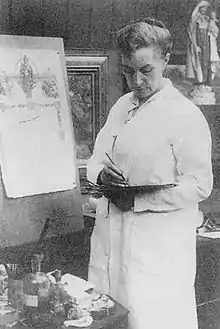 Eleanor Fortescue-Brickdale, c. 1900 | |
| Born | 25 January 1872 Upper Norwood, Surrey |
| Died | 10 March 1945 (aged 73) |
| Nationality | British |
| Alma mater | |
| Known for | Painting |
Life
Fortescue-Brickdale was born at her parents' house, Birchamp Villa in Upper Norwood, Surrey as Mary Eleanor Fortescue Brickdale the daughter of Matthew and Sarah Fortescue Brickdale.[1] Her father was a barrister. She was trained first at the Crystal Palace School of Art, under Herbert Bone and entered the Royal Academy Schools in 1896. In that year she also exhibited a work at the Royal Academy, RA, and won a prize for designing a lunette, Spring for the RA Dining Room.[2] Her first major painting was The Pale Complexion of True Love (1899). She soon began exhibiting her oil paintings at the Royal Academy, and her watercolours at the Dowdeswell Gallery, where she had several solo exhibitions.[3]
While at the academy, Fortescue-Brickdale came under the influence of John Byam Liston Shaw, a protégé of John Everett Millais much influenced by John William Waterhouse.[3] When Byam Shaw founded his art school in 1911, Fortescue-Brickdale became a teacher there.
In 1909, Ernest Brown, of the Leicester Galleries, commissioned a series of 28 watercolour illustrations to Tennyson's Idylls of the King, which Fortescue-Brickdale painted over two years. They were exhibited at the gallery in 1911, and 24 of them were published the following year in a deluxe edition of the first four Idylls.[3]
She lived during much of her career in Holland Park Road, opposite Leighton House, where she held an exhibition in 1904.[3]
Fortescue-Brickdale exhibited at the first exhibition of the Society of Graphic Art in 1921.[4]
Later, she also worked with stained glass. She was a staunch Christian, and donated works to churches. Amongst her best known works are The Uninvited Guest and Guinevere. She died on 10 March 1945,[5][6] and is buried at Brompton Cemetery, London.[7]
Books illustrated
- Poems by Tennyson, 1905
- Pippa Passes by Robert Browning, 1908
- Men and Women by Browning, 1908
- Dramatis Personae by Browning, 1909
- Dramatic Romances and Lyrics by Browning, 1909
- Idylls of the King by Tennyson, 1911
- Story of St Elizabeth of Hungary by WM Canton, 1912
- Book of Ols English Songs and Ballaids by WM Canton, 1915
- Eleanor Fortescue Brickdale's Golden Book of Famous Women, 1919
- The Sweet and Touching Tale of Fleure and Blanchfleure, 1922
- Carols, 1925
- Golden Treasury of Songs and Lyrics published by Palgrave, 1925
- A Diary of an Eighteenth Century Garden, Calthorp, 1926.[2]
Works
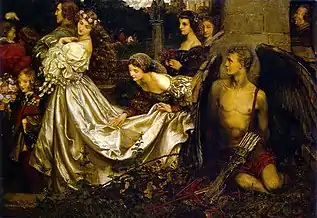 The Uninvited Guest, 1906.
The Uninvited Guest, 1906.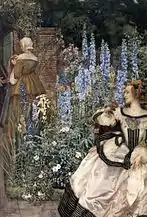 They toil not, neither do they spin
They toil not, neither do they spin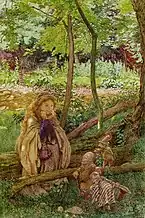 The introduction
The introduction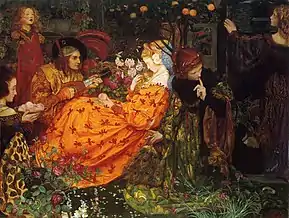 Riches
Riches
Golden book of famous women (1919)
_-_cover.jpg.webp)
_(14777074592).jpg.webp) Intro
Intro
_(14590723400).jpg.webp)
_(14777445755).jpg.webp)
_(14590736330).jpg.webp)
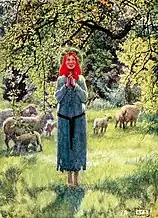
_(14590743250).jpg.webp)
_-_The_Queen's_Marie.jpg.webp) "Yestreen Queen Mary had four Maries, This night she'll hae but three; She had Mary Seaton, and Mary Beaton, And Mary Carmichael, and me" (Mary Hamilton)
"Yestreen Queen Mary had four Maries, This night she'll hae but three; She had Mary Seaton, and Mary Beaton, And Mary Carmichael, and me" (Mary Hamilton)_-_Una_and_The_Red_Cross_Knight_(p._143).jpg.webp)
_(14797322763).jpg.webp)
_(14590815808).jpg.webp)
_-_Guinevere_(p._191).jpg.webp)
_(14777464575).jpg.webp)
_(14775111384).jpg.webp)
_-_St._Catherine_of_Siena_(p._239).jpg.webp)
_(14590758180).jpg.webp)
See also
References
- Reference Entry at Oxford University's Index. doi:10.1093/ref:odnb/55176. Retrieved 26 July 2017.
- Christopher Wood (1978). The Dictionary of Victorian Painters. Antique Collectors' Club. ISBN 0 902028 72 3.
- Lupack, Barbara Tepa; Lupack, Alan (2008). Illustrating Camelot. Boydell & Brewer. pp. 126–8. ISBN 978-1-84384-183-8.
- "List of Members", Catalogue of the First Annual Exhibition of the Society of Graphic Art, London: Society of Graphic Art: 45–48, January 1921
- Jan Marsh & Pamela Gerrish Nunn (1997). Pre-Raphaelite Women Artists.
- "Notable Monuments". The Friends of Brompton Cemetery. Archived from the original on 13 October 2016. Retrieved 14 April 2020.
- Pamela Gerrish Nunn (2012). A Pre-Raphaelite Journey.
External links
| Wikimedia Commons has media related to Eleanor Fortescue-Brickdale. |
- 6 paintings by or after Eleanor Fortescue-Brickdale at the Art UK site
- Works by Eleanor Fortescue-Brickdale at Project Gutenberg
- Works by or about Eleanor Fortescue-Brickdale at Internet Archive
- Paintings by E. Fortescue-Brickdale (Art Renewal Center)
- Paintings by E. Fortescue-Brickdale (Pre-Raphaelite Women)
- E. Fortescue-Brickdale - short biography and works ("Celtic Twilight")
- Eleanor Fortesque Brickdale's Golden Book of Famous Women, London, New York, Toronto: Hodder and Stoughton, 1919.